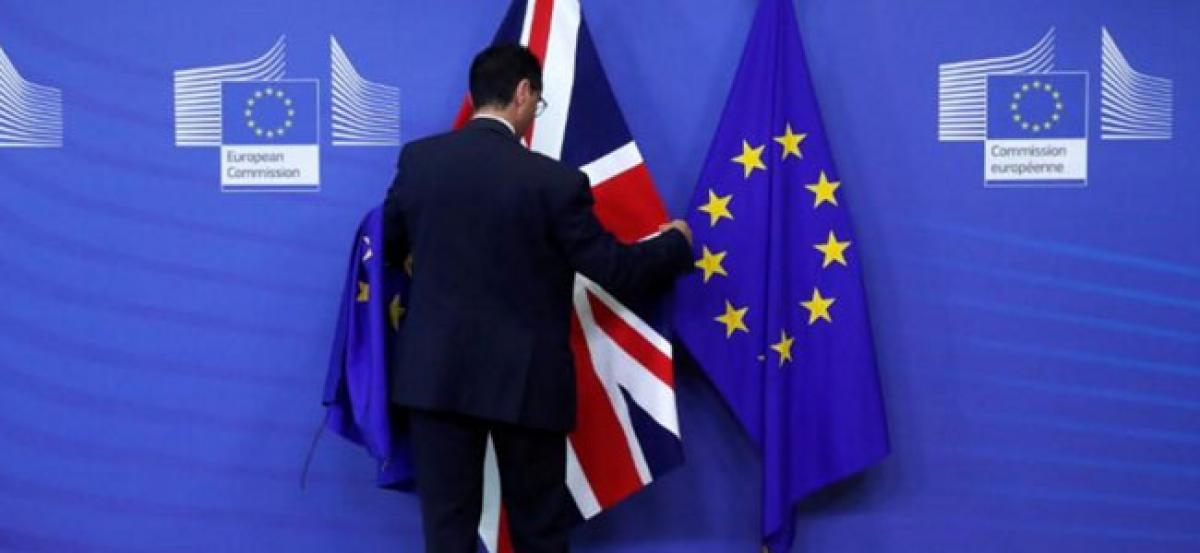Live
- First Impressions and Unboxing of the MacBook Pro M4: A Powerhouse for Professionals and Creators
- China Gears Up for Potential Trade War Amid Trump’s Tariff Threats
- Small Farmers Gain Less by Selling to Supermarkets: Study Reveals
- Why Despite the Controversy, America Is Anticipating the Mike Tyson vs. Jake Paul Fight
- Sanju Samson and Tilak Varma Shine: Record-Breaking Feats in 4th T20I Against South Africa
- India Urges $1.3 Trillion Annual Climate Support for Developing Nations
- Bad air: 106 shuttle buses, 60 extra Metro trips planned to make Delhiites give up cars
- WHO reports declining monkeypox cases in Congo
- CM Attends Kotideepotsavam on Kartika Purnima
- PKL Season 11: Raiding trio of Devank, Ayan, Sandeep help Patna Pirates rout Bengal Warriorz
Just In

The automatic right of European Union citizens to live and work in Britain will end in March 2019 with Brexit, Prime Minister Theresa May\'s spokesman said on Monday, after her ministers publicly differed over the shape of the divorce with the EU.
LONDON: The automatic right of European Union citizens to live and work in Britain will end in March 2019 with Brexit, Prime Minister Theresa May's spokesman said on Monday, after her ministers publicly differed over the shape of the divorce with the EU.
Since May's failed gamble on a snap election last month, the future of Brexit has been thrown into question with squabbling between her ministers over the pace, tone and terms of Britain's departure from the club it joined in 1973.
May, who on Monday interrupted a three-week holiday to attend a World War One commemoration ceremony, has faced public pressure to temper her plans for a clean break from the EU.
The level of discord is such that one opposition politician spoke of "civil war" within the government over Brexit and some of the bloc's most powerful politicians have even raised the prospect of Britain scrapping Brexit.
May has repeatedly said Brexit will take place as scheduled in late March 2019.
But the Archbishop of Canterbury said the chance of this was "infinitesimally small" because political wrangling will prevent the detailed work that is needed.
Justin Welby, who is the spiritual head of the Anglican communion of millions of Christians globally and sits in the House of Lords, said domestic political wrangling would impede the detailed work that is needed for Brexit.
In response, May's spokesman said the government remained committed to the exit timetable.
Immigration Is Hot Issue
Immigration from the EU is one of the most contentious issues because the economy relies on imported labour but many British voters are angry over what they consider to be uncontrolled immigration.
"Free movement will end in March 2019," May's spokesman told reporters, adding that the government had already set out some details including proposals on EU citizens' rights after Brexit.
"Other elements of the post-Brexit immigration system will be brought forward in due course. It would be wrong to speculate on what these might look like or to suggest that free movement will continue as it is now."
The British government has for years failed to meet a pledge to reduce net migration below 100,000 a year. May's spokesman said it would take time to get the numbers down, but the government was committed to doing so.
Finance minister Philip Hammond said last week that there should be no immediate change to immigration rules when Britain leaves the bloc, and Interior Minister Amber Rudd said there would be no 'cliff edge' on leaving the EU.
But Trade Minister Liam Fox said allowing free movement after Brexit would not "keep faith" with the referendum result and that the government had not reached a consensus on keeping open EU immigration for a transitional period.
The length of a potential transition period to allow business to adapt to the potential upheaval caused by Brexit is another contentious issue. There has been no clear guidance from May's team on how long the transition should be.
Brexit "Civil War"
Vince Cable, leader of the pro-EU Liberal Democrats said the "civil war" within May's cabinet over Brexit was now so serious she should return from her holiday and take charge.
"There are more government positions than there are cabinet ministers. The government is in total disarray. Unless the cabinet can agree a position how can it possibly negotiate Brexit on behalf of Britain with the EU?," he said.
The EU's top Brexit negotiator Michel Barnier told EU ambassadors last week that negotiations on the future relationship between Britain and the EU are now less likely to start in October due to a lack of progress at the initial stage of talks about the breakup.
Hammond was also reported as saying Britain does not intend to lower taxes far below the European average in order to remain competitive after Brexit, contradicting comments he himself had made earlier in the year.
The pro-Brexit UK Independence Party said remain-supporting ministers were now "actively promoting confusion and uncertainty" in order to undermine Brexit negotiations and seek to reverse the process.
May's spokesman said there was broad agreement across government and within her team of ministers about the need to make Brexit as smooth as possible. The government position on Brexit remains as set out by May in a January speech, he added.
He cited comments from that speech in which May said that it was "in no-one's interests for there to be a cliff edge for business" but that this did not mean seeking "some form of unlimited transitional status".
The details of any implementation period are to be negotiatied but the government is not looking for an "off-the-shelf model", he said, after a Financial Times report that Hammond hoped for such an option.

© 2024 Hyderabad Media House Limited/The Hans India. All rights reserved. Powered by hocalwire.com







